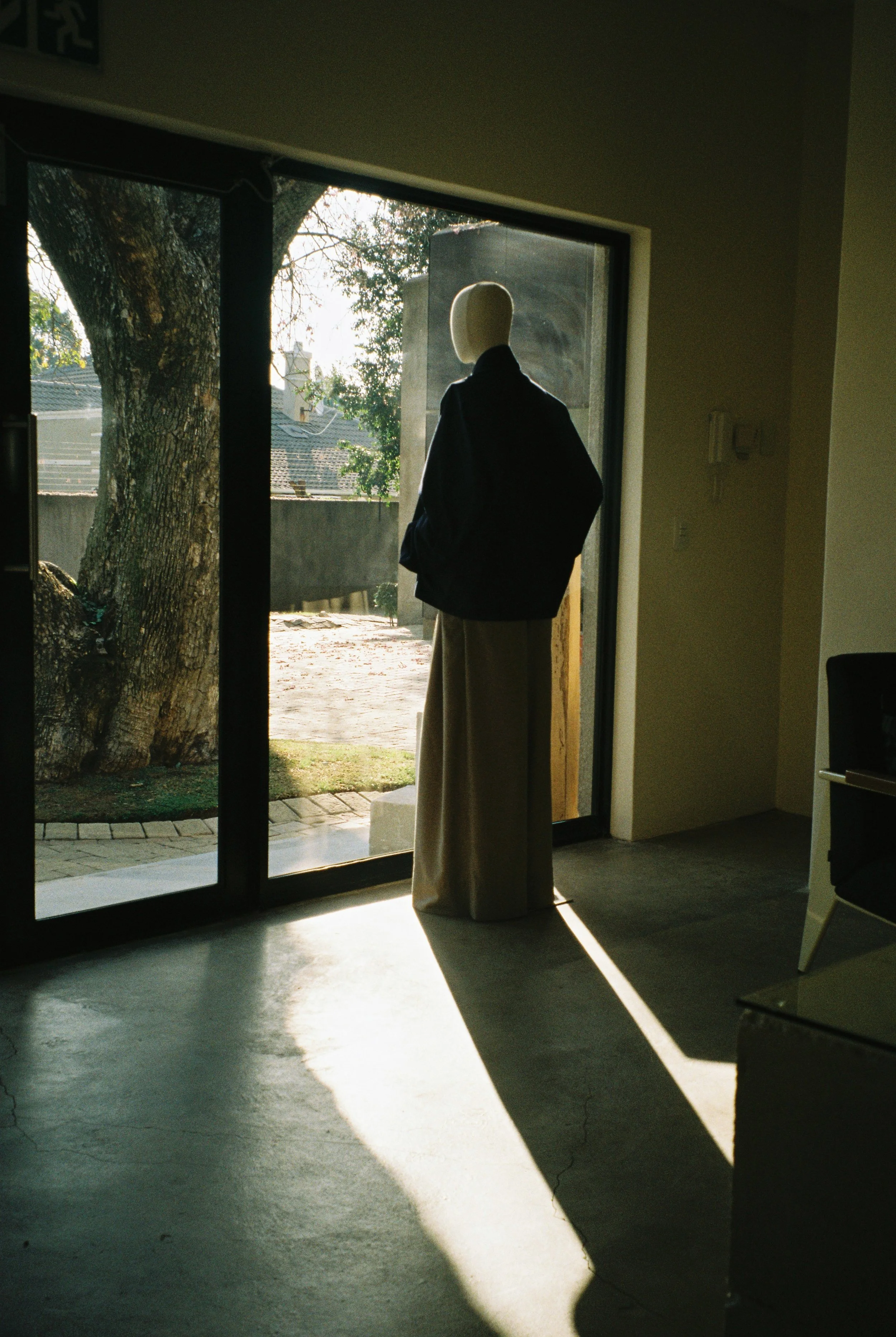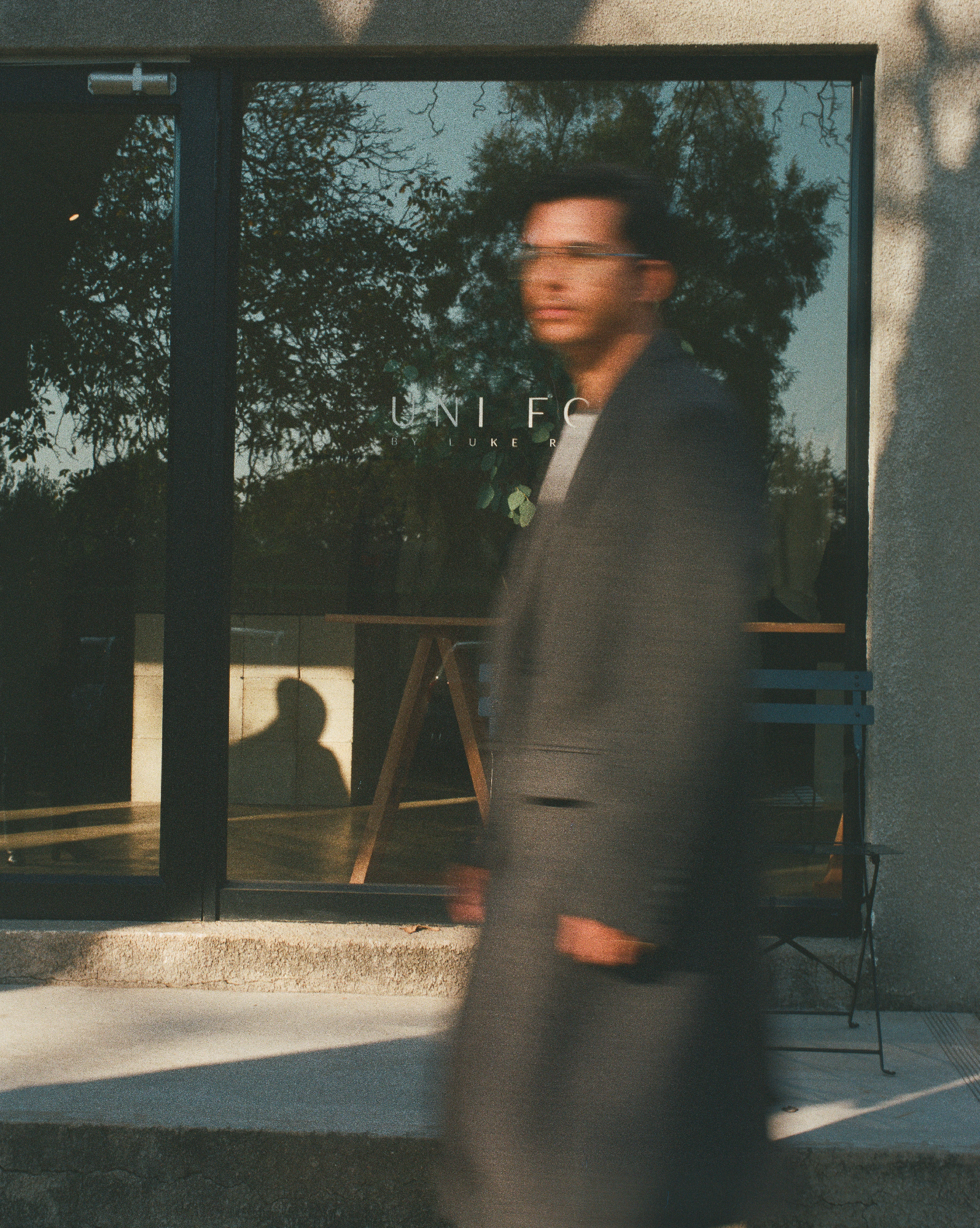In conversation with Luke Radloff about the ethics and aesthetics that fuel UNI FORM
"I can find inspiration anywhere in my direct environment," Luke Radloff explains as we meet at his mid-century modern apartment-cum-studio in Illovo, Johannesburg. The designer and creative director of UNI FORM captures the city’s essence in the brand’s relaxed, inclusive and trans-seasonal garments. "You get this interesting intersection of work and personal life attire seen more during people’s commutes," he observes of the style of the daily migrating workers who are testament to the industrious mindset of the city. “That’s the true street style of Johannesburg.” It’s this unique confluence of functionality and personal expression that UNI FORM seeks to instil in each exceptional piece.
Yet as the inaugural laureate of the Azzedine Alaïa Foundation x Orveda Prize last year, Radloff was spirited away from home. During his month-long residency in Paris, he studied Alaïa’s personal and extended archives of 20th century couturiers including Madame Grès and Christóbal Balenciaga and received mentorship from the director of the Parsons School in Paris, Marco Pecorari among others. The experience was nothing short of transformative. “There were no limitations in terms of what I wanted to create and what that would look like,” he recalls. “I got very method and lived in Paris as if I was retracing Mr Alaïa’s footsteps.”
While Radloff had the liberty to craft his capsule collection in Paris, this didn’t feel authentic to the brand. “We knew we needed to make everything in South Africa, put it on a global platform and show everyone what we have here at home, what we’re capable of, and further that conversation,” he says. “We have elevated our staple cotton pieces into the world of couture and by doing so, understand that our processes and techniques have always been that of a couture nature.”
This has culminated in UNI FORM’s A/W 2024 collection, Communion, which debuted at the Fondation during Paris Fashion Week. With exceptional textures and fluid silhouettes, each garment pays tribute to indigenous South African craft and raw materials. Collaborating with local handcrafters, the pieces also spotlighted the talents of Lorne Jewellery, Nondumiso Qba Nkosi, Githan Coopoo and Gerda Goosen.
“One of the most important things of handcraft is the authenticity and the soul that goes behind it”
We gravitate toward the rails in his studio where some of the Communion pieces hang peacefully, save for the stray pieces of thread magnetically drawn to them, and upon close-up inspection, they do not disappoint. Meanwhile behind us, masking the sound of the taxi rank outside, is the soft hum of sewing machines and the sharp glide of fabric scissors wielded by Radloff's tailor duo. It’s this delicate dance of contrasts that seep into every stitch.
Born and raised in East London in South Africa's Eastern Cape, Radloff was drawn to fashion, theatre and performance during high school. "I discovered that fashion could be a means to express your point of view." He moved to Johannesburg to study fashion at LISOF (now STADIO) and then went to work for Jacques van der Watt of Black Coffee. After that, he relocated to London to gain experience in visual merchandising for several brands including Marni. And five years later, he returned home where he became a stylist, creative director and textile procurer. “It was an opportunity to travel Africa and get a greater sense of African style throughout the continent." Recalling his travels to Ghana, Rwanda and Nigeria, Radloff adds, “Sourcing textiles can lead you to places you wouldn't necessarily end up as a tourist. I saw fascinating markets and met amazing people.”
UNI FORM was born in 2020 and since then Radloff has become known for championing natural and regenerative plant-based fibres and smart textiles. The exquisite wet felted wool and mohair textiles by Stephanie Bentum and woven cottons by Barrydale Hand Weavers used in the Communion collection underscore the brand's commitment to responsible production processes. Textile waste sourced from a factory in the Eastern Cape, famed for its traditional Shweshwe and uMbhaco fabrics, was given new life at the Barrydale factory in the Karoo Desert using their antique handlooms. Amidst the country’s persistent energy crisis, processes like hand weaving and beading are important because they require no electricity. “But one of the most important things of handcraft is the authenticity and the soul that goes behind it,” Radloff emphasises.
This is further encapsulated by the brand’s concept of “emotional tailoring,” which speaks to the dedication required to create garments of true value and luxury, along the way overcoming obstacles to achieve the highest quality construction and finish. “Emotional tailoring also speaks to the emotional connection that the wearer has to a garment and how that makes a garment more meaningful,” the designer adds. The strength of this bond then has the potential to extend a garment's life. The most fulfilling part of being a designer for him is when a customer's mood is transformed when they try on one of his pieces for the first time. “I've seen it happen so many times. That moment is so special and quite moving.”
“For something to become classic, it needs to reference the past, the present, and innovation in the future”
The designer takes the same contemplative and sincere approach to ethics as he does aesthetics. "We like to talk more about responsibility than sustainability," he says with refreshing candour. "The conversation around sustainability over the past few years has become muddied.” With greenwashing becoming commonplace, he is heavy with concern for the state of the industry. So, in addition to carefully considered fibres and production volumes, UNI FORM embraces more casual silhouettes that accommodate different body types. “The garments are rooted in our specific perspective and not in trend. They’re true to us. For something to become classic, it needs to reference the past, the present, and innovation in the future.”
Putting the brand in good stead for the future is the UNI FORM concept store, which opened in 2023 on Parktown North's busy 7th Avenue and has become a space to engage with the community. "People see that we're making garments of real quality and real luxury. The clothes do all the talking," Radloff explains. While appointments are required for weekday visits, the store warmly welcomes the public on weekends with a charming mini-flower market that weaves the brand into the fabric of the city. "I think it's getting to be able to continue another day," he reflects with quiet determination. Running an independent fashion brand in the African market is no small feat. "That's why I'm so inspired by other local designers."
Radloff looks forward to continuing to put emphasis on impactful projects and collaborations while fostering ongoing discussions surrounding handcrafts and ethical manufacturing. Amid this state of comfortable uncertainty, the designer boldly confronts prevailing narratives regarding Africa's inexpensive labour and dispels any comparisons to China's exploitative clothes manufacturing practices. And he dreams of establishing South Africa as a global hub for luxury production on a par with fashion capitals in the Global North. “Africa is not the next anything. We always have and always will be innovators.”
Visit UNI FORM
Words Kemiso Wessie
Portrait photography Assante Chiweshe
Communion AW24 photography Raquel Franco
Model Summer Thompson
Art direction Bee Diamondhead and Luke Radloff
Woven cotton textiles by Barrydale Hand Weavers
Beaded headpiece Nondumiso Qba Nkosi
Neckpieces Gerda Goosen
Silver accessories For Lorne
Published on 26/07/2024








